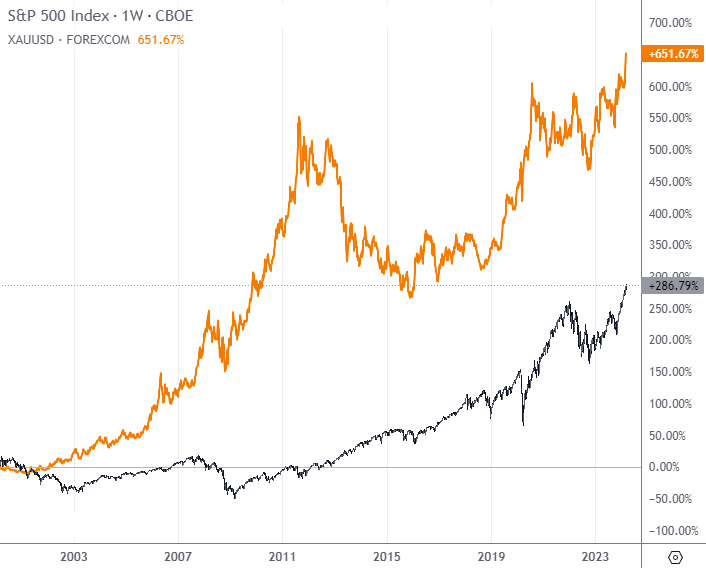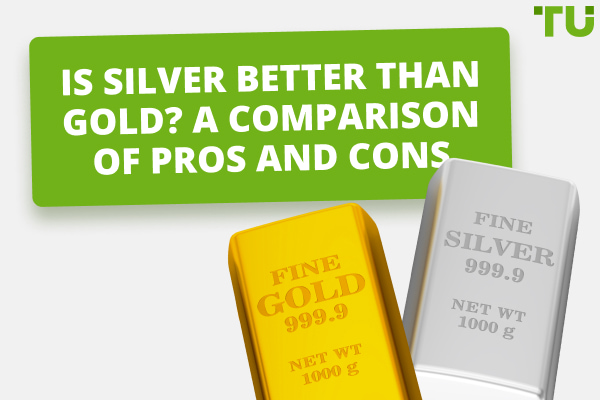Stocks vs Gold: Which is Better to Invest in?
It is believed that an investment capital allocation of 50-60% in favor of stocks and 5-10% in favor of gold may be acceptable in many cases. But you can change the proportion to better suit market cycles, your financial plan and the characteristics of each asset:
-
Gold Pros: Inflation hedge, Safe haven asset. Good for diversification
-
Gold Cons: No passive income. Lower growth potential compared to stocks
-
Stocks Pros: Potential for significant capital growth. Good for dividend income. Wide array of choices
-
Stocks Cons: Complexity and need for extensive research. Companies can go bankrupt
Diversification and stability often steer the investor's compass. Stocks and gold - two contrasting investment landscapes - entice with their unique appeal.
Equities offer a share in a company's future, potentially teeming with growth and dividends, aligning with a forward-thinking investment ethos. Conversely, gold's ancient luster endures, a harbor in tumultuous economic seas, promising a time-tested hedge against inflation and currency devaluation.
Savvy investors canvas these options, seeking to balance their portfolio with growth potential and a shield against market volatility.
-
Is it better to invest in gold or shares?
Whether it's better to invest in gold or shares depends on your investment goals, risk tolerance, and market conditions. Shares offer growth and income potential while gold is a hedge against inflation and uncertainty.
-
Is gold more profitable than stocks?
Gold can be more profitable than stocks in certain market conditions, especially during high inflation or economic instability; however, over the long term, stocks have historically outperformed gold.
-
Will The Price Of Gold Go Up?
The price of gold fluctuates based on supply and demand, market sentiment, geopolitical stability, and macroeconomic factors, and while it may rise in response to certain conditions, predicting its movement with certainty is challenging. For further insights, it’s recommended to read the following resource: Will The Price Of Gold Go Up? Analysts' Target Prices.
-
What investment is better than gold?
Investments considered better than gold can vary based on individual preferences and market trends, but historically, equities have offered higher long-term growth potential, albeit with higher risk.
Gold vs stocks chart: Which is a better investment for you?
The journey from 2000 to 2024 paints a vibrant picture when comparing gold and stock investments.

S&P-500 vs Gold: A long-term chart since 2000
The chart before us underscores gold's significant ascendancy in percentage terms, yet a discerning eye must account for the broader narrative. Stock investments are frequently augmented by dividends - reinvested, they compound, potentially transforming the trajectory of returns.
Moreover, gold and stocks serve different strategic purposes. Gold is a stronghold, often resilient during economic downturns, whereas stocks are the sprinters, racing ahead in robust economic climates, their performance tethered to corporate successes.
Ownership, too, differs markedly. Physical gold can be held in hand - bars, coins, jewelry - imparting a sense of tangibility. Stocks, on the other hand, signify ownership in a company's assets and future earnings, typically held as certificates or more commonly, digital entries.
The path to investing in either asset class also diverges; stocks are acquired through exchanges, with a myriad of options from blue-chips to nascent startups, while gold can be purchased through dealers, banks, and even ETFs that track its price.
When examining this chart, one must weigh their goals - whether seeking growth, preservation of capital, or perhaps, a blend of both. Each asset class shines under different economic lights, and thus, personal investment goals and timelines become pivotal in this decision.
Gold vs stocks historical returns
When considering historical returns, the narrative often hinges on the time frame scrutinized. Here, we'll craft a succinct table encapsulating the returns of gold and stocks (specifically the S&P 500 index) over various time horizons.
This table of financial history will contrast the returns, providing a glimpse into the investment landscape shaped by these two distinct asset classes.
| Time Period | Gold Returns | S&P 500 Returns |
|---|---|---|
Last Year |
10.1% |
14.95% |
Last 5 Years |
63.7% |
86.65 |
Last 10 Years |
97.0% |
194.70% |
Last 20 Years |
493.5% |
479.44 |
Last 40 Years |
298.2% |
6,506.25% |
For more nuanced and detailed information on gold returns, read our article on What Is The Average Return On Gold?
According to Traders Union analyst Andrey Mastykin, gold and stocks should not be seen as mutually exclusive assets in an investor's portfolio. While each asset class has its own advantages and disadvantages, they can complement each other to reduce portfolio risk and potentially enhance returns. Also worth noting, despite its historical role as an inflation hedge and safe haven, gold remains a controversial asset with some, like Warren Buffett, questioning its lack of intrinsic value. However, others, like Ray Dalio, advocate for a diversified portfolio that includes gold, emphasizing its low correlation with stocks. Ultimately, the decision to invest in gold depends on an investor's individual goals and risk tolerance.
Best brokers to trade gold

Is it worth putting money in stocks?
Venturing into the stock market is akin to setting sail in the vast ocean of capitalism, where the waves of corporate growth can lift fortunes with the promise of rewarding returns. As with any investment, stocks carry their own spectrum of advantages and disadvantages.
👍 Advantages Explained:
• Capital Growth: Stocks represent ownership in a company, offering the potential for capital appreciation as the company grows. Over the long term, the stock market has historically provided substantial returns to investors, outpacing inflation and other investment classes
• Income Through Dividends: Some stocks pay dividends, providing a source of income that can be used for living expenses or reinvested to purchase additional shares. This dividend reinvestment can exponentially increase the value of an investment over time
• Liquidity: Stocks are generally liquid assets, especially those listed on major exchanges. This means they can be quickly sold for cash when needed, providing financial flexibility to investors
• Diversification: The stock market offers a wide array of industries and sectors, enabling investors to spread their risk by building a diversified portfolio, which can protect against the underperformance of any single sector or investment
👎 Disadvantages Explained:
• Market Volatility: The stock market can be unpredictable, with prices fluctuating widely on a daily basis. This volatility can be unnerving, especially for those who are new to investing or those with a low tolerance for risk
• Complexity: Understanding the stock market requires a significant amount of research, knowledge, and attention. Picking the right stocks and timing the market can be challenging even for seasoned investors
• Potential for Loss: Investing in stocks involves the risk of losing the initial investment, especially if one is not well-diversified or tries to time the market
• Emotional Investing: The volatility of the stock market can lead to emotional investing, where investors make decisions based on panic or euphoria rather than sound financial judgment
For those new to the equities market, "How To Invest In Stocks: A Clear Guide For Beginners" by TU is an invaluable resource, offering step-by-step advice on navigating this dynamic market.
Is it a good idea to invest in gold?
The allure of gold has endured through the ages, prized for its rarity and luster, and as an investment, it offers a unique profile of benefits and drawbacks.
👍 Advantages Explained:
• Hedge Against Inflation: Gold has historically maintained its purchasing power over the long term, serving as an effective hedge against inflation. As living costs rise, gold prices tend to rise along with them, helping to preserve the wealth of investors
• Safe Haven Asset: In times of economic uncertainty or political turmoil, investors often flock to gold as a safe haven. Its price tends to move inversely to the stock market, providing a buffer in a diversified investment portfolio
• Diversification: Gold is considered a diversifying investment. It has historically had a low correlation with other assets such as stocks and bonds, which can help to spread risk
• Tangible Asset: As a physical commodity, gold can be owned in the form of bullion, coins, or jewelry. This tangibility can be appealing during times of widespread crisis or when confidence in traditional financial systems is waning
👎 Disadvantages Explained:
• No Passive Income: Unlike stocks, gold does not pay dividends or interest. The only returns come from capital gains when you sell gold for more than you paid
• Storage and Insurance Costs: Physical gold requires secure storage and insurance, both of which can erode returns over time
• Price Volatility: The price of gold can be highly volatile in the short term, influenced by factors such as currency values, interest rates, and market sentiment
• Opportunity Cost: Gold might not appreciate as much as stocks during bull markets, potentially leading to lower returns compared to investing in growth assets
For further insights about investing in gold, consider educating yourself using our resource Is Gold A Good Investment? Top Pros And Cons Of Buying.
Gold vs stocks: similarities and differences
While gold and stocks may appear as diverse as night and day in the investment universe, they share the fundamental aim of wealth generation. Both can be traded on global markets, and their prices are influenced by economic indicators, geopolitical events, and market sentiment. Diversification is another commonality, as both can be used to diversify an investment portfolio, though they often play very different roles within it.
However, the differences are striking. Stocks represent a share in a company and its future earnings, potentially offering dividends and voting rights. Gold, in contrast, is a finite physical resource that serves as a store of value and a hedge against economic uncertainty. While stocks are directly linked to the industrial growth and the corporate earnings that fuel economies, gold is often seen as a refuge during market turmoil and inflation.
Is gold a better investment than stocks?
The debate on whether gold is a better investment than stocks is nuanced and hinges on individual investment goals and market conditions. While stocks have the potential to offer higher growth due to economic expansion and innovation, gold provides a protective bulwark against inflation and economic uncertainty.

Investing in gold and stocks can diversify each other
And you should not confuse profitability and feasibility of investment. Even if something doesn't yield a higher return than other sources, it doesn't mean that it can be neglected. If we dig deeper into market history, investors who ran "into gold" just before the stock markets crashed in 2008 and 2020 (thanks to insider information, effective strategies, and personal trader's "flair") made very good money.
There is a clear correlation between stocks and gold that is more than 100 years old:
-
During cyclical downturns in the economy, the price of gold rises actively (due to panic demand) and stock prices fall because investors perceive it as both the cause and effect of the crisis
-
When the economy is positive for an extended period of time, gold loses the focus of investors' attention as they return to equities in search of active earnings
Prudent investment strategy often doesn't necessitate an “either-or” choice but rather a balanced allocation that benefits from the strengths of both assets. An investor might, for instance, allocate a portion of their portfolio to gold to mitigate risk, while investing a larger share in stocks to capitalize on growth.
Rinat Gismatullin, TradersUnion expert, advises to start with the classical proportion in the investment portfolio – 50-60% allocation for shares and 5-10% for gold. And then adjust this balance according to your financial plans, market cycles and other influencing factors.
Can you buy gold as a stock?
An alternative to the complexity and disadvantage of storing gold in physical form can be gold-linked securities.
Indeed, you can gain exposure to gold through the stock market. This is typically achieved by investing in exchange-traded funds (ETFs) that track the price of gold, or by purchasing shares in gold mining companies.
Gold ETFs offer the dual advantage of reflecting the price of physical gold while providing the liquidity of stock investments. Shares in gold mining companies, on the other hand, can offer dividends and growth potential, though they may also introduce additional risks related to the company's specific mining operations.
At the same time, ETF assets can be sold at any time without leaving home, they cannot be stolen or "lost" in any other way. And you don't have to pay anything for storage (in some cases, a penny broker's commission).
Find out what the best gold stocks are in our article Top Gold Stocks | 7 Gold Mining Companies To Invest.
Expert Opinion
In the vast expanse of investment opportunities, gold and stocks stand as beacons for diverse financial strategies and objectives. Gold, with its enduring value, offers a safe haven during turbulent times and a hedge against inflation, while stocks, the quintessential instruments of equity investment, offer the lure of growth and income through dividends.
Therefore, you should choose between them not on the principle of "better/worse", but on the principle of "what is better in a particular situation" and "in specific proportions".
The optimal option for any "gold" investor is a combination of securities (ETFs for gold, shares of gold mining companies) and gold, and ordinary market gold should not exceed 5-10% of the portfolio.
A balanced portfolio often weaves both these threads—gold for stability and stocks for growth—into a robust financial tapestry. While neither asset is superior in all circumstances, the savvy investor understands that the true merit lies in a strategic blend that aligns with personal financial goals, time horizons, and risk tolerance.
In this dynamic financial landscape, the golden rule is diversification, and a well-considered allocation to both gold and stocks can be the cornerstone of a resilient investment portfolio.
Team that worked on the article
Vuk stands at the forefront of financial journalism, blending over six years of crypto investing experience with profound insights gained from navigating two bull/bear cycles. A dedicated content writer, Vuk has contributed to a myriad of publications and projects. His journey from an English language graduate to a sought-after voice in finance reflects his passion for demystifying complex financial concepts, making him a helpful guide for both newcomers and seasoned investors.
Dr. BJ Johnson is a PhD in English Language and an editor with over 15 years of experience. He earned his degree in English Language in the U.S and the UK. In 2020, Dr. Johnson joined the Traders Union team. Since then, he has created over 100 exclusive articles and edited over 300 articles of other authors.
The topics he covers include trading signals, cryptocurrencies, Forex brokers, stock brokers, expert advisors, binary options. He has also worked on the ratings of brokers and many other materials.
Dr. BJ Johnson’s motto: It always seems impossible until it’s done. You can do it.
Mirjan Hipolito is a journalist and news editor at Traders Union. She is an expert crypto writer with five years of experience in the financial markets. Her specialties are daily market news, price predictions, and Initial Coin Offerings (ICO). Mirjan is a cryptocurrency and stock trader. This deep understanding of the finance sector allows her to create informative and engaging content that helps readers easily navigate the complexities of the crypto world.










